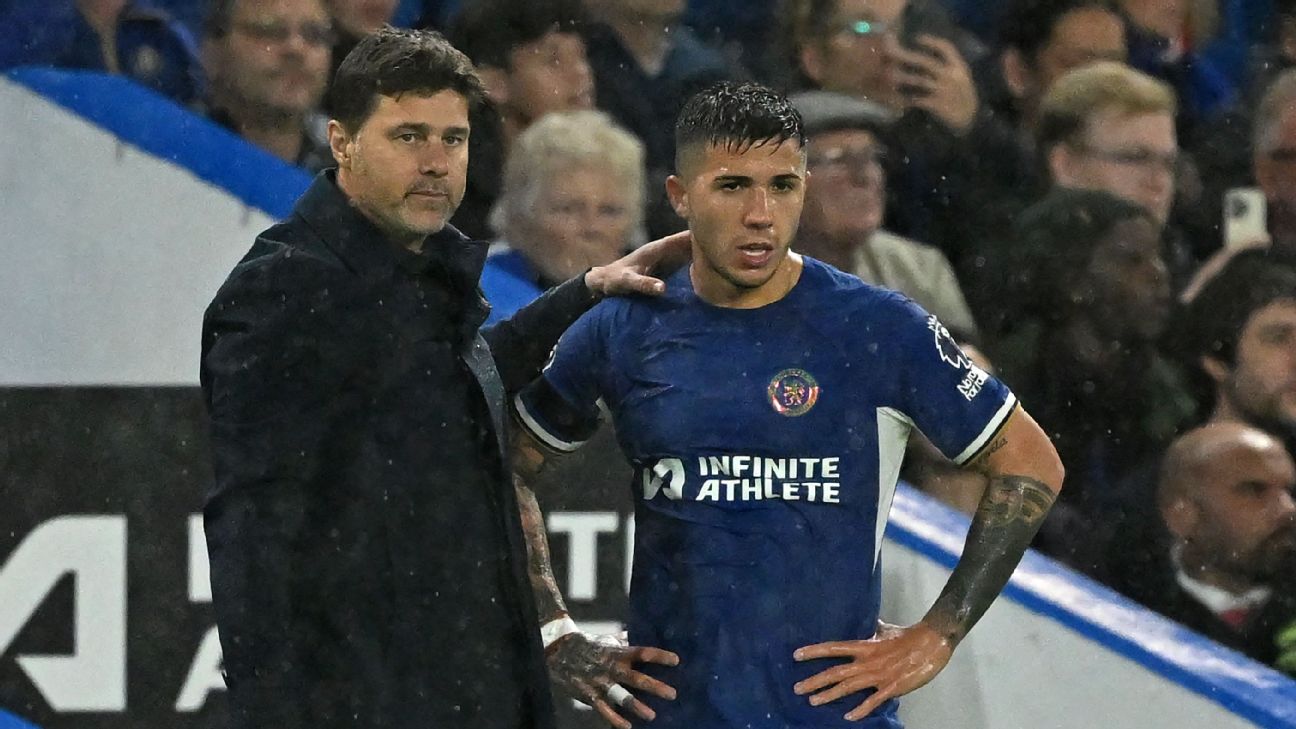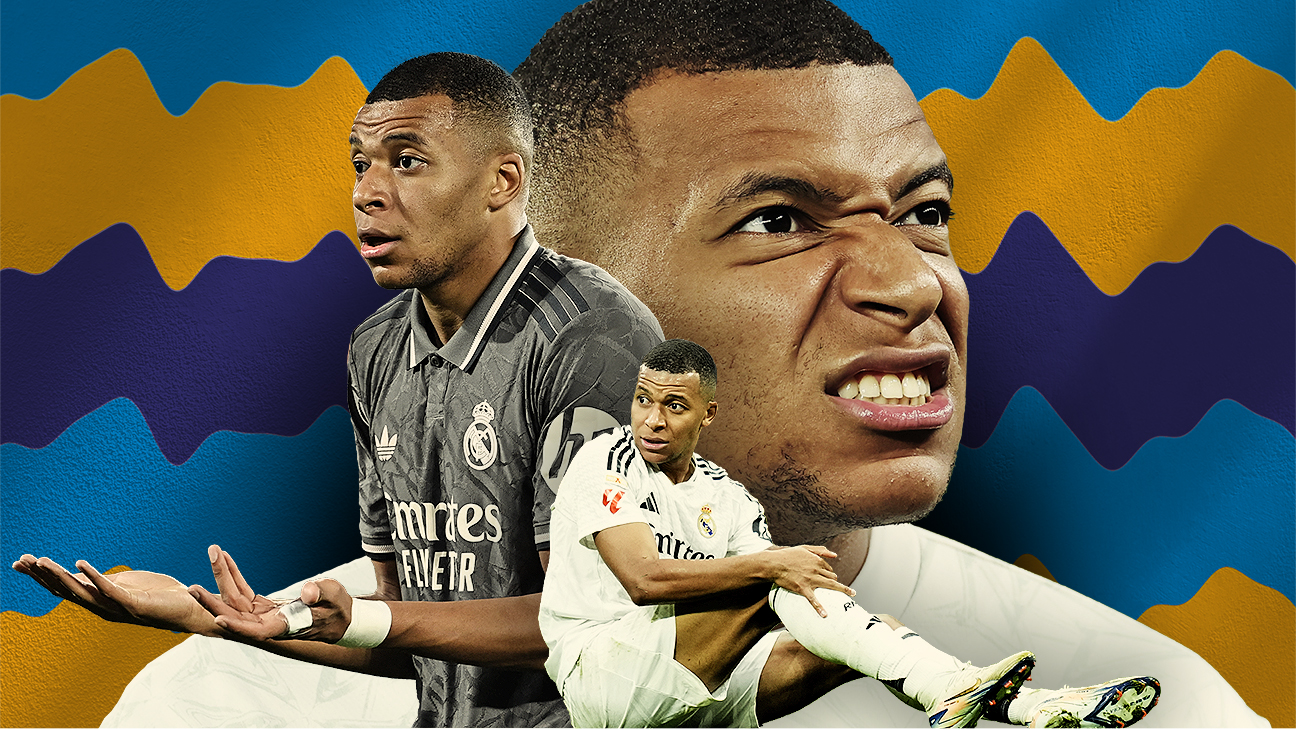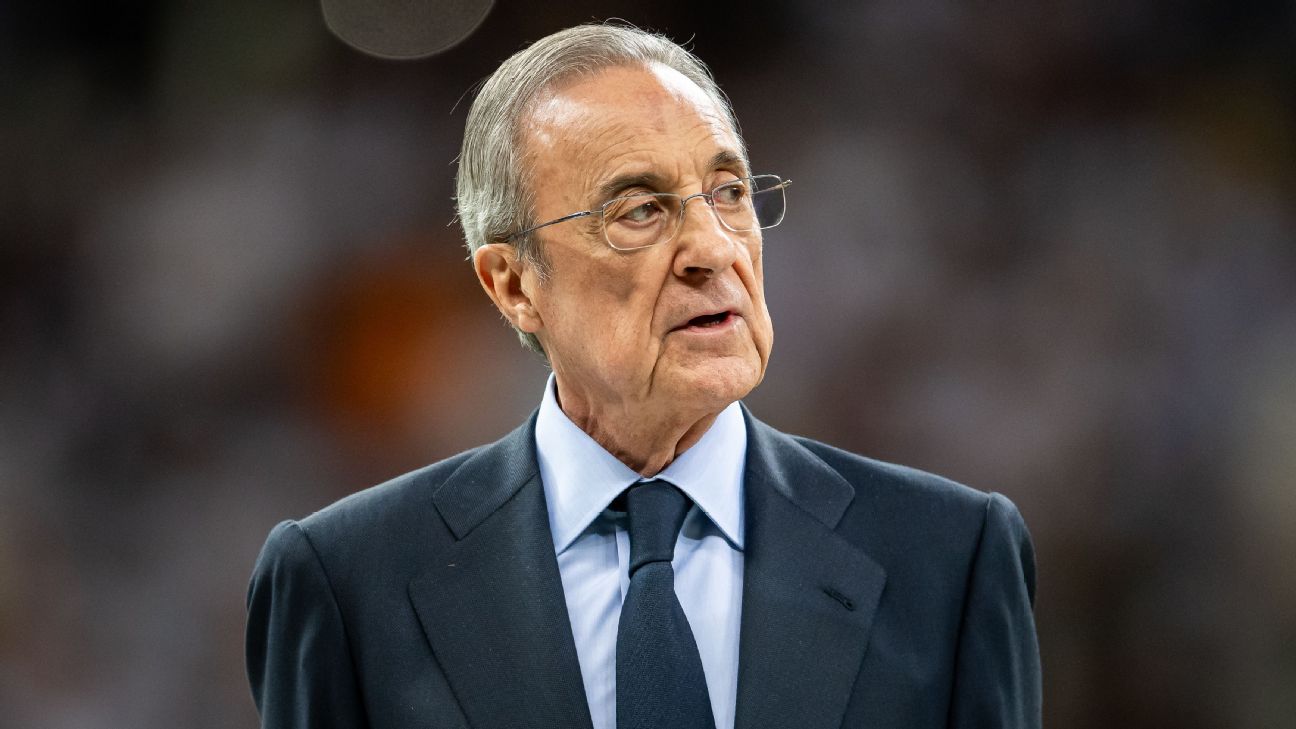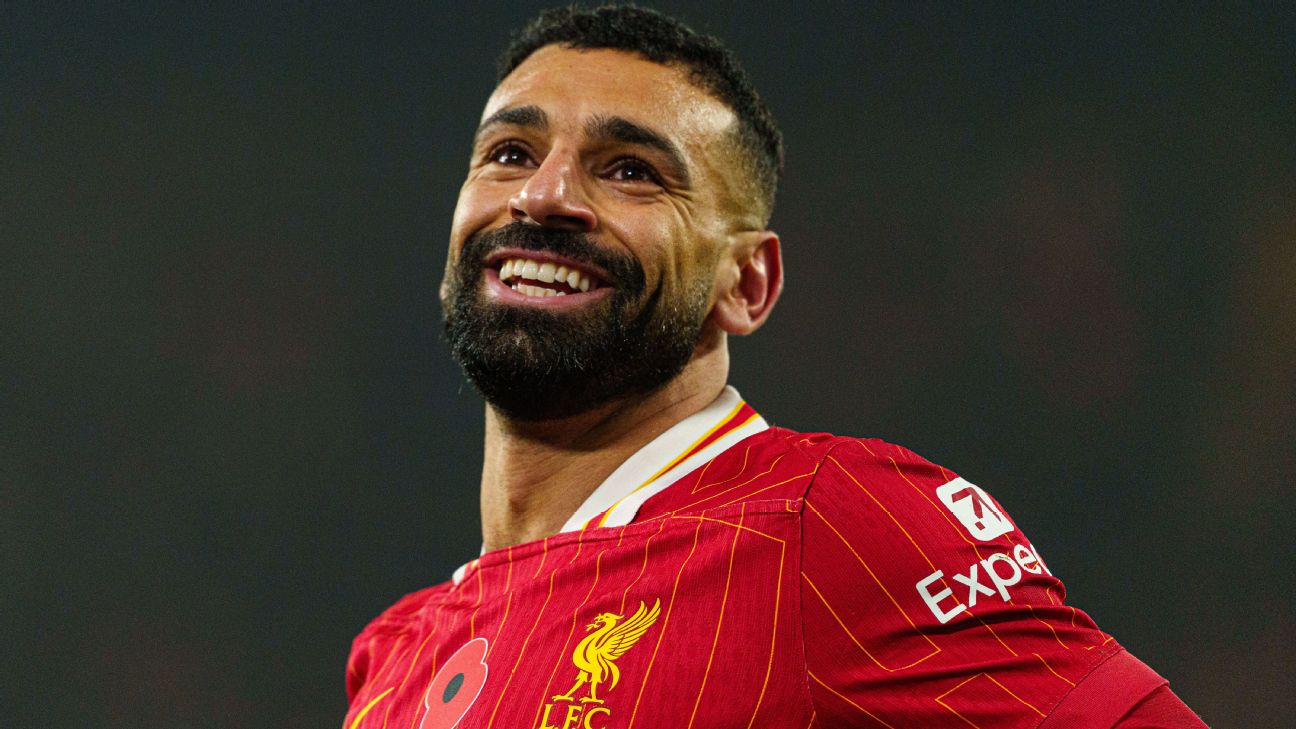The January transfer window usually doesn’t move the needle.
In all of Europe’s “Big Five” leagues since 2012, only six players were signed in January by teams that weren’t in first place at the time, but ultimately went on to win the league. And none of those players even became starters by the end of the season. They were all impact subs — at best.
At the same time, players like Virgil van Dijk and Nemanja Vidic — Premier League legends, two of the best defenders England has ever seen — joined their clubs in January. Martin Odegaard joined Arsenal in the January window. Same goes for Julián Álvarez and Manchester City, too.
While for every Luis Suárez, there’s also a Denis Suárez, no team is perfect, and even a minor improvement could be the difference between a title and a runner-up medal. So, with tight races for the title and for the fourth- and fifth-place spots for the Champions League, we’ve taken a look at which teams in the top half of the table are most urgently in need of an upgrade. Then, we ranked the moves in order of how impactful they could be.
 10. Chelsea: No one, especially not a striker
10. Chelsea: No one, especially not a striker
Chelsea don’t really have any urgent needs for two reasons: (1) They’ve spent more than any team ever has on transfer fees since last summer; and (2) they’re not even close to qualifying for the Champions League.
Per Stats Perform’s projections, the Premier League has a 77% chance of earning a fifth Champions League place in next year’s revamped competition. And per Stats Perform’s projections, Chelsea has a 1.3% chance of finishing among those places.
One big reason, it would seem, is that they don’t have a goal scorer. Chelsea control nearly 60% of the possession in their matches, and yet they’ve scored only 33 goals — just the eighth most in the 20-team league. As such, they’re currently in 10th place, 20 games into the season. And so, we therefore must apply the classic diagnosis for any underachieving team: Get ’em a proper striker!
To which, I say: They might already have one!
Although he has scored only seven non-penalty goals so far this season, summer signing Nicolas Jackson is generating per 90 minutes more non-penalty expected goals, or xG, (0.66) than all but three other players in the Premier League. These are all of his shots in the Premier League — the bigger the circle, the more xG his shot was worth:
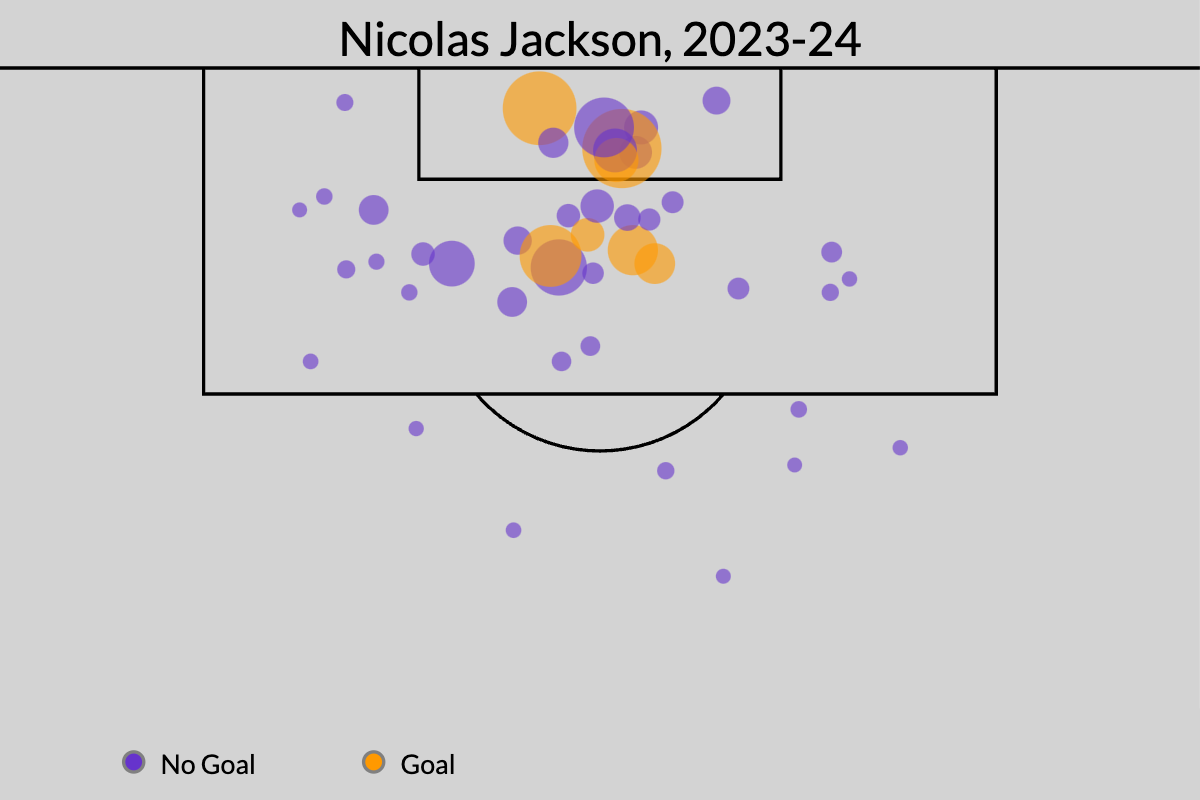
The most likely outcome, here, is that Jackson starts converting these chances at or above his xG — that is always the most likely outcome in these situations. The ability to get on the end of the chances is way more predictive and sustainable than the ability to convert the chances themselves.
If Jackson does start to achieve league-average conversion rates, at 22, he immediately becomes one of the most valuable players in the Premier League. While there’s a chance that Jackson is one of those rare players who is significantly worse at converting shots into goals than the average player, it would be foolish not to give him the rest of the season to start turning those chances into goals.
The same idea goes for the rest of Chelsea’s season: don’t worry about signing any more players in an attempt to convert on that 1.3%. Instead, use the rest of the season to figure out which players on this massive roster are the ones worth building around going forward.
Chelsea spent nearly $1 billion in the previous two transfer windows
 9. Manchester United: What don’t they need?
9. Manchester United: What don’t they need?
New minority owner (but controller of sporting operations) Jim Ratcliffe enters into a pretty cushy situation, for now.
Manchester United are horrible. They have a negative expected goal differential and a negative actual goal differential. The main reason they’re so bad: not many good players! And so Ratcliffe’s team could really sign any talented young player, at any position, and it would help the club.
Both fullback spots could be upgraded, as Luke Shaw is 28 and can’t stay healthy, while the right backs aren’t good enough. At center back, Lisandro Martinez, who has been hurt for most of the season, is the only reasonable long-term option on the roster. In the midfield, the players are either old, not good enough or both. Bruno Fernandes is the only consistent performer, but he’ll be 30 next season and won’t be a part of the next great Manchester United team — if there ever is one.
And then, up top, Rasmus Hojlund is young and promising, but not so promising that you couldn’t upgrade him with a young and better player. The same is true for Alejandro Garnacho on the wing. Antony might be the worst signing in the history of the Premier League. Marcus Rashford is probably the one player worth building around, but his presence shouldn’t preclude you from signing another winger, given how every great team has more productive wide forwards than it does starting wide-forward slots.
Man United need help, but there’s not really much urgency here since United’s likeliest finishing position per Stats Perform is ninth — but if a good young player becomes available for the right price, United should jump on it.
 8. Newcastle United: A defender, any defender
8. Newcastle United: A defender, any defender
This could be a defensive midfielder or a center back, but whoever it is, Newcastle need someone who’s going to help them stop conceding so many goals.
Thanks to a lights-out performance from goalkeeper Martin Dúbravka, Newcastle’s 4-2 loss to Liverpool had the veneer of an honorable, back-foot, last-ditch defensive performance. In actuality, it was one of the worst games you’ll ever see a Champions League team play. They conceded more xG than any team in any of the Big Five leagues since the 2010-11 season, which is as far back as TruMedia’s xG data goes:
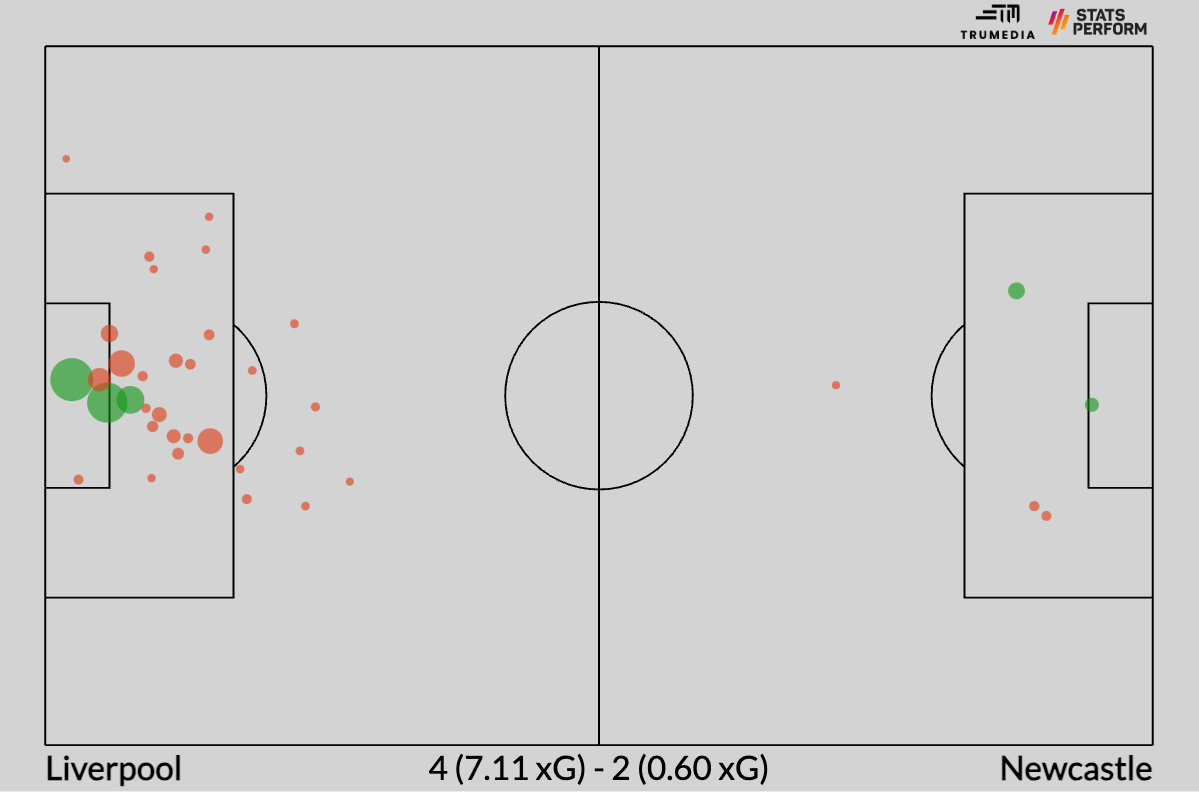
Newcastle now rank 15th in non-penalty xG conceded in the Premier League, a year after finishing the season in second. No one player will fix that, but 30-year-old Jamaal Lascelles, one of the final holdovers from the pre-Public Investment Fund of Saudi Arabia era, has played over 1,000 minutes at center back this season. And the midfield of Sean Longstaff, Joelinton and Bruno Guimaraes just hasn’t been able to hold up without the ball.
It’s unlikely that Newcastle qualify for the Champions League again, so the upgrades don’t seem as urgent here. But they have shown a higher ceiling than any teams outside of the Liverpool, Manchester City and Arsenal trio. Maybe adding some center back depth and/or a true defensive midfielder in January could spur them onto a second-half run back up the table.
 7. Brighton: Midfielders
7. Brighton: Midfielders
In the simplest sense, Brighton are about half as good as they were last year. Their per-game non-penalty xG differential has dropped from +0.69 to +0.32.
The biggest change from last season? Well, Alexis Mac Allister and Moisés Caicedo combined for 6,025 Premier League minutes last season. However, this season, they’ve played 2,464 combined minutes — all for teams not named Brighton. This year, those minutes have been taken up by Pascal Gross, James Milner and Adam Lallana, who are a combined 105 years old, and Billy Gilmour and Carlos Baleba, who are a combined 44 years old.
This is a silly exercise, in a way, because Brighton probably look further into the future than any other club in the league when they make personnel decisions. That probably explains why the club is not really showing any urgency in replacing two of the better midfielders in the Premier League over the summer. But if they want to give fifth place a real shot over the next couple months and try to get one of the new spots that have been added to the Champions League, they’d find it easiest to upgrade the current options in the middle of the park.
 6. Aston Villa: Full-back
6. Aston Villa: Full-back
Aston Villa are sitting pretty right now. They have an outside shot at winning the league, and barring a massive collapse, they should finish top five.
If they really want to push for the title, then the move would be to bring in another attacker, someone who provides the low-percentage possibility of going supernova and taking the league by storm for a couple of months. But with Ollie Watkins, Leon Bailey and Moussa Diaby, plus some decent support from Jhon Durán and Nicolò Zaniolo, it’s not the surest area to upgrade.
Instead, that would be one, or both, of the full-back slots. For a bunch of years, Lucas Digne did a solid Andy Robertson impression — both moving the ball upfield and creating chances — for Everton and Aston Villa. However, he’s 30 now, and he’s not too important in ball progression or chance creation for Villa this year. Same goes for Matty Cash, who’s only 26.
Per Stats Perform, there’s about a 10% chance that manager Unai Emery’s team finishes the season outside of the top five. Upgrading on one of the full-back slots seems like it’d be the easiest way to make sure that doesn’t happen.
 5. Manchester City: Midfielder, full-back, or someone who does both
5. Manchester City: Midfielder, full-back, or someone who does both
City are the only team on this list who could suffer a serious injury to a key player and still harbor realistic hopes of finishing the season where they want to finish. How do I know that? They’ve suffered serious injuries to arguably their two most important players, Erling Haaland and Kevin De Bruyne — and their other most important player, Rodri, has also missed 20% of the domestic minutes this season. Despite all of that, they’re still the betting favorites to win the league.
I don’t really think City need to do anything this January, especially since De Bruyne is back and Haaland is expected back soon, but City’s biggest sputter this season occurred when Rodri missed time. Their xG differential with Rodri on the field this season is +19.9 and their total xG differential this season is +18.9. In other words, their opponents created an additional goal’s worth of chances when Rodri was missing during that not-insignificant chunk of non-Rodri minutes this season.
Rodri is so good as to be irreplaceable, so maybe the alternative is to sign one traditional full-back — they don’t have any! — and downshift to a more straightforward style of play when Rodri is out. They could try to find a full-back who’s comfortable sliding into the midfield to provide cover, or they could just sign another holding midfielder whom manager Pep Guardiola trusts, unlike the other one currently on the roster, Kalvin Phillips. (And Phillips is likely heading out of the Etihad this year anyway.)
City can probably weather a recurrence of both De Bruyne’s and Haaland’s injuries. They’d probably figure it out without Rodri, too, but the alternative is less clear. They’d be wise to figure out a backup plan.
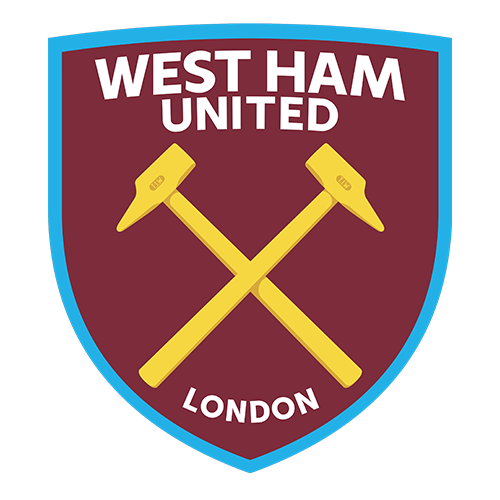 4. West Ham United: Striker
4. West Ham United: Striker
This is the easiest one on the list.
With 0.53 non-penalty expected goals plus assists per 90 minutes, Jarrod Bowen is the only player on West Ham with a mark that even breaks 0.4. For context, there are 57 players in the Premier League averaging at least 0.4 npxG+xA per 90 so far this season.
More specifically, West Ham’s theoretical center forward, Michail Antonio, is averaging 0.28 npxG+xA per 90 — which ranks seventh on his own team and, uh, 108th in the entire league.
I’m of two minds here, though. West Ham are not what I would call “a good soccer team” despite sitting sixth in the Premier League table. Twenty games into a season, goal differential is almost always a better indicator of team quality than points, and West Ham have a plus-3 goal differential, which is tied with Chelsea for eighth best in the league. Drop down another level to non-penalty xG differential, and the Hammers are at minus-6, which is the fifth-worst mark in the league.
In a slightly parallel universe, with the exact same chances and a different set of conversion rates for themselves and their opponents, West Ham are on the outskirts of the relegation battle. Instead, they’re just five points out of fifth.
There’s almost no chance West Ham can maintain their current performance level and finish fifth. But they also have the Europa League to focus on. And well, they’ve banked so many points already that if they can go out and find another attacker who produces at a level similar to Bowen, then they’d still have a decent chance at sneaking into the Champions League next season. Who knows when they’ll be this close again?
 3. Arsenal: A forward
3. Arsenal: A forward
Ryan O’Hanlon discusses why Arsenal need to bring in someone else to ensure Bukayo Saka remains fit and on form.
I debated putting Arsenal lower on this list since I think their recent struggles have, paradoxically, lessened the urgency for a move. What do I mean? Well, most of Arsenal’s problems — to my eye — have come down to the vagaries of kicking a round ball with whatever shape the human foot is. Arsenal, Liverpool and Manchester City all have almost identical non-penalty xG differentials at this point in the season, but the Gunners sit five behind Liverpool, and they’re tied with City, who have a game in hand.
If the three teams are roughly equal with each other, then Arsenal are at a major disadvantage since they have to find a way to win points at a higher rate over the final 18 games of the season than both City and Liverpool do. And because of that, their chances of winning the league have plummeted. Per ESPN BET, their championship odds are currently +650, which comes out to around a 13% chance of winning it all.
A 13% chance doesn’t demand a win-now transfer move in the way their position in the table did last year. But their odds of winning the Champions League are right around the same level as their current league odds. So if we do some quick math and combine the odds, there’s a 25-ish% chance that Arsenal win either the Premier League or the Champions League.
Given the performance level of the team and the age profile, I don’t actually think that number is particularly high. They’re one of the best teams in the world right now, and that doesn’t seem likely to change over the next couple of seasons. But still, 25% isn’t nothing.
If Arsenal do have an issue this season, it’s that the attack isn’t particularly good. And while I do think that has more to do with systemic changes made by manager Mikel Arteta to the way the team plays than anything else, a simple way to improve a team that’s not generating enough attack is to sign better attackers. As Liverpool and City have proved over the years, you really can’t have enough elite attacking players — you never know who’s going to be in and out of form or who’s going to be healthy.
While the rumors are all about a “Proper Center Forward,” I think I’d look more for a more flexible attacker, especially one who can play minutes on the right wing.
There’s a long-term benefit to easing off Bukayo Saka’s minutes load — lower likelihood that your star young player suffers a debilitating injury before he even reaches his prime — but there’s possibly a short-term benefit, too. In fewer minutes, maybe Saka’s production is more efficient, while the new attacker experiences the typical boost that substitutes get, and then the overall production from that position increases.
 2. Liverpool: Someone to replace Trent Alexander-Arnold
2. Liverpool: Someone to replace Trent Alexander-Arnold
Ryan O’Hanlon explains why Trent Alexander-Arnold is so important for Liverpool and who the club should bring in to support him.
Liverpool have a near-unlimited well of midfielders all of a sudden. They have a ton of attacking depth. And even with Joël Matip’s injury, the emergence of Jarell Quansah means that they have at least a couple of decent backup center back options if and/or when Virgil van Dijk or Ibrahima Konaté go down.
Heck, they lost both their first- and second-string left backs to injury, and they’ve been fine there, too. An injury to Alisson would be a disaster, but that’s just life with a world-class goalkeeper — you can’t have two of them.
Instead, Liverpool’s biggest weakness is the spot on the depth chart behind Trent Alexander-Arnold. The 25-year-old is just simply one of the best players in the world, full stop.
In this new, hybrid not-quite-a-midfielder-or-a-full-back role, TAA leads all Premier League full-backs in:
-
shot-creating actions
-
progressive passing distance
-
through balls
-
switches of play
-
middle-third touches
-
ball recoveries
He’s also in the 95th percentile or better in:
-
shots
-
expected goals assisted
-
progressive passes
-
passes into the final third
He’s basically Andrea Pirlo? I’m not even kidding — Pirlo is probably the last player we’ve seen be this much of an all-around, truly dominant attacking force from a role that starts so deep on the field.
Without TAA in the lineup and leading the way in pretty much all phases of the offensive game, what would happen to Liverpool? It’s not like there’s another player who could replicate what Alexander-Arnold does, and a big part of the reason Liverpool are so good this year is that manager Jurgen Klopp has essentially built the team around his right back’s unique and special set of skills.
So, it’s not like they could sign a worse version of Alexander-Arnold. Instead, I think the move should be to sign a more conservative right back — a César Azpilicueta-esque hybrid center back/full-back — which would balance out the side were TAA to get hurt after Andy Robertson returns from injury. And were he not to get hurt, this kind of player would also give Klopp the option of playing Alexander-Arnold in a deeper midfield role from the start.
Liverpool have a very real shot at winning their second-ever Premier League title. They could probably find a way to piece together enough performances over the last few months were Mohamed Salah or Van Dijk to get injured, but it’s hard to see how any of this would work without TAA in the side — unless they find him some support in January.
(With news breaking on Tuesday morning that Alexander-Arnold will be out for “weeks” with a mild knee ligament tear, we’ll quickly find out just what this Liverpool side will look like without him.)
 1. Tottenham: A center back
1. Tottenham: A center back
The case here is quite simple, too.
Tottenham have more to lose than anyone else in the league this season. The current top four teams — Liverpool, Aston Villa, Man City and Arsenal — are very unlikely to finish outside of the top five. Per Stats Perform, there’s a 30% chance that Spurs finish outside the top five and about a 50% chance they finish outside of the top four. Throw in the fact the Premier League isn’t guaranteed a fifth spot for the Champions League, and there’s a real chance that Spurs miss out of Europe’s top club competition next season.
How to change that? Well, this team’s defense is horrible. While we can expect some above-average finishing from any team with Son Heung-min leading the forward line, we can’t say the same about their defensive over-performance, especially given manager Ange Postecoglu’s uncompromising, high-pressing style, which almost by definition coughs up a number of high-quality opposition chances. And yet, Spurs have conceded just 24 non-penalty goals — fifth best in the league — from 31.7 xG — fifth worst in the league.
The main reason they’ve been able to survive despite constantly getting battered by their opponents: Guglielmo Vicario has been unreal in goal. Per Stats Perform’s model, which quantifies the difficulty of every on-target shot a goalkeeper faces, the Italian keeper has saved 6.7 goals more than expected — by far the most in the league. Purple are saves, orange are goals, and each circle is sized by the xG value of the chance.
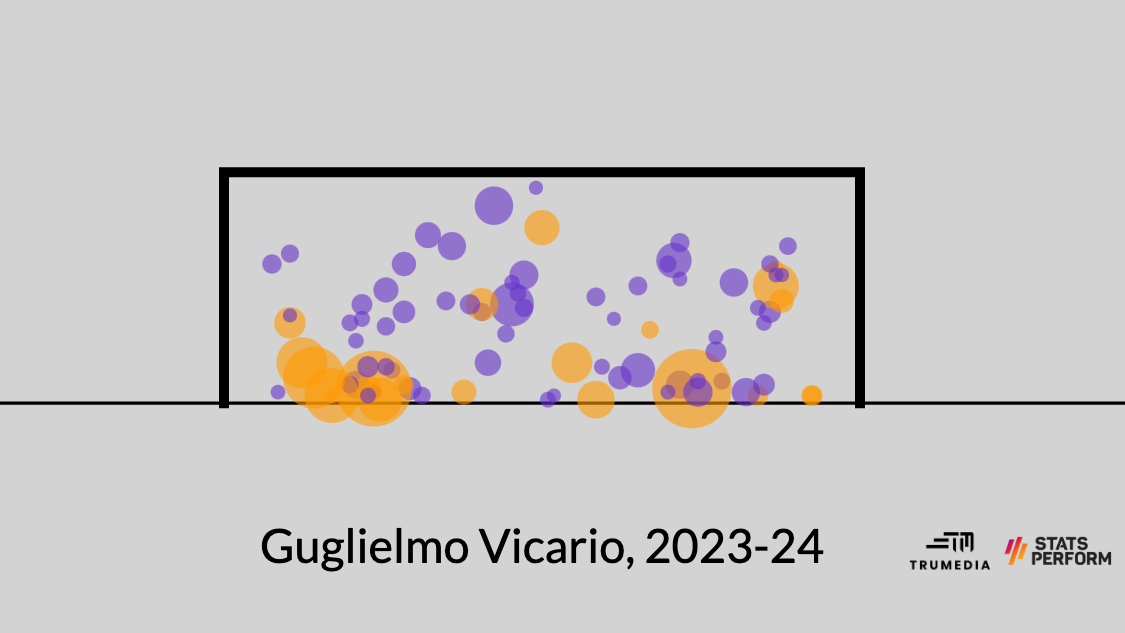
Given that Vicario was basically a league-average shot-stopper in his three seasons prior to joining Spurs, it doesn’t seem wise for the club to expect this level of performance to continue. Instead, Spurs need to find a way to stop conceding so many high-quality opportunities, and the easiest way for a high-pressing team to do that is to improve on its center backs.
Although Spurs have two center backs who fit Postecoglu’s style, Cristian Romero is a walking red-or-yellow-card-suspension risk and summer signing Micky Van de Ven has missed much of the season with an injury. The options behind those two are Ben Davies and Emerson, who are average full-backs, let alone center backs.
Center back play in a system like Postecoglu’s is incredibly demanding, and it just doesn’t work for long when you have only two players who are capable of covering all the space behind when a team presses high. For this approach to function long term, Tottenham needs to build out its center back depth. Luckily for them, doing so would also directly aid in their immediate goal: finding a way back into the Champions League.
